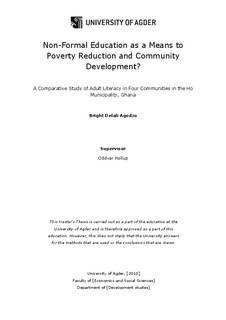| dc.description.abstract | This research work examines the impacts of the literacy programme on the improvement of
literacy, education, reduction of poverty and community development, especially in the rural
and poor communities. The work sets out to put across a measure of knowledge on how
literacy could assist in making non-literates and the poor in society functionally literate, at the
same time provide them with livelihood skills towards improved living standards and the
development of their various communities.
Non-formal education, that is the functional literacy programme, was set up in communities
with the aim of providing literacy and life skills to the poor, illiterate and marginalised in the
community. It makes the above population to be able to read and interact favourably with the
environment. By implication, the literacy programme ultimately helps to achieve the UN’s
Millennium Development Goals (MDGs) of universal basic education by mopping up those
who could not get access to formal education; reducing extreme poverty through training of
the poor population in life skills and income generating activities; and reducing mother and
child mortality, diseases and deepening democracy through the teaching of the above related
topics in the adult literacy class.
Findings from the research show that most of the adult learners in the four communities
(Kpedze, Akome, Mawuli Estates and Beh) have acquired reading, writing and calculation
skills through the literacy class organised under the National Functional Literacy Programme
(NFLP). These skills were exhibited by the learners in their everyday life activities including
writing down their income and expenses, creditors and debtors, reading the Bible, singing
from the church hymnal, writing and reading simple letters and notes, etc. These are
educational achievements made by the adult learners. Through the NFLP classes, quite a
number of the learners have also acquired income generating skills and entered into gainful
employment, raising their income levels, thereby contributing to the reduction of poverty in
the local communities. The learners also gradually became active members of their
communities, initiating and executing community development programmes that they have
been learning from the NFLP activities which are indications of development efforts.
However, the adult learners faced challenges such as poor infrastructure, non-availability and
late delivery of teaching and learning materials, poor remuneration of their facilitators, poor
monitoring and evaluation systems, difficulties in time management and health constraints on
the part of the learners, and political interference in the NFLP and the NFED. What the adult
learners have not fully achieved is sustainability that is easily forgetting what they have learnt
due to lack of continuity in the NFLP, among other things. | en_US |
